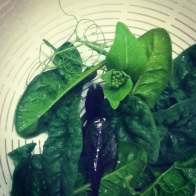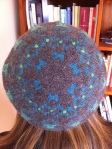“If I could say anything to a depressed person right now, it would be: ‘You are loved. You have worth. And the world is absolutely better with you in it.’”
Matthew Reilly, quoted in The Weekend Australian Magazine, June 23, 2012.
I spent a day on my parents’ couch yesterday. Struggling to recover from the ‘flu, there was no way I was going to be on my own with the three kids while my hubby was at a conference in Hobart. There are certain times when I recognise that I need help, and I’m willing to drive two-and-a-half-hours (twice in one day) to get it.
It turned out to be a wonderful day. The kids travelled extremely well. The weather was magnificent. We made good time, we were kept safe on the roads. And I had some amazing conversations with Mum and Dad.
At one point, Mum was downstairs making bead necklaces with the kids, and Dad and I were reading, knitting and chatting. He was reading the Weekend Australian Magazine, which contained an interview with writer Matthew Reilly about the death of his wife. Dad was sombre. At one point, he began to read the sentence I have quoted above. He got two-thirds of the way through before he had to hand the magazine to me so that I could read it myself.
Having seen his reaction, I steadied myself, and braced for emotional impact. I put my reviewer hat on, and pretended to be brave and unaffected. Doubtless, I did not fool Dad. But I did manage to read and make comment on the quotation without bursting into tears.
I still have not read the article. I intend to. But just from that one sentence I can tell that Matthew Reilly gets it; his comment goes to the heart of depression. The question ringing in the brain: Is the world any better with me here?
Yes. It is. If you are wondering that right now, be assured that it is.
That question is such a human one to ask. I’m sure many people ask it at some point in their lives, whether depressed or not. For those with depression and other forms of mental illness, all too often the answer is a resounding ‘no’.
People who hear ‘no’ in answer to this question are not being dramatic, melancholic, morbid, maudlin or whatever else you may perceive. The very chemistry of their brain means that the answer arrives, not in the form of a trite remark, or a one-word answer. The answer arrives as a fully-conceived, formulated, evidentiary and well-supported argument. One that takes incredible supplies of strength, energy and clarity to refute. And these reserves are often severely depleted in the depressed brain.
Unbelievably, the mere words of another person can also carry weight. You may think it pointless to argue with, to reason with, a depressed person. Do it anyway. They may choose not to hear. They may not be able to hear past the interference. But they may, just may, really need to hear it anyway.
It was not so much that my Dad shared a quotation or an article with me that made an impact yesterday. He does that a lot.
It was not the mere fact that he took the time to communicate what he did. It was the emotion he showed.
I’ve always known he and Mum love and support me. Yesterday I caught a glimpse of the heart of a parent who is grateful his daughter is still here. And it made me feel profoundly pleased to be here too.
Lifeline Support: 13 11 14
Beyond Blue Australia: Infoline 1300 22 4636











